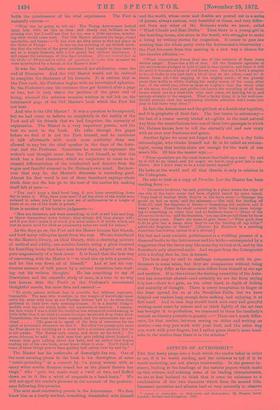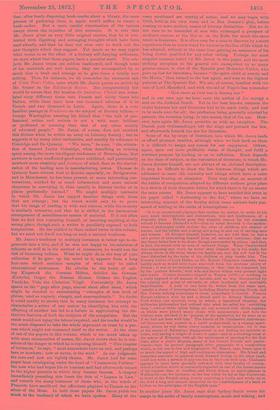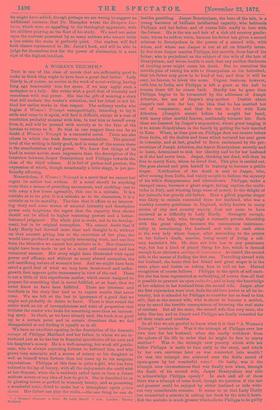ASPECTS OF AUTHORSHIP.* THE first hasty peeps into a book
which the reader takes in order to see if it be worth reading, and the reviewer to tell if it be worth reviewing, are not always trustworthy. In the present in- stance, looking at the headings of the various papers which make up this volume, and noticing some of its leading characteristics, we are at first inclined to think that it owes its existence to a combination of the two elements which form its second title. Incessant quotation and allusion lead us very naturally to observe
• Aspects of Authorship; or, Boot-marks and Book-makers. By Francis Jac= London : Hodder and Stoughton. MM. that, after freely dispersing book-marks about a library, the were process of gathering them in again would suffice to create a book-maker. But a more careful examination of the various essays shows the injustice of this sentence. It is true that Mr. Jacox gives us very little original matter, that he is con- tented with digesting and arranging thoughts which have been used already, and that he does not even care to work out the new thoughts which they suggest. Yet much as we may regret what seems to us the effect of a literary self-denying ordinance, we must admit that these papers have a peculiar merit. The sub- jects Mr. Jacox treats are seldom hackneyed, and though some of his materials are well known, they are accompanied by so much that is froth and strange as to give them a totally new setting. Thus, for instance, we all remember the enormous sale of Uncle Tom's Cabin, upon which Mr. Jacox quotes an article by Mr. Senior in the Edinburgh Review. But comparatively few would be aware that the treatise De Imitations Christi was trans- lated sixty different times into French and thirty times into Italian, while there have been one thousand editions of it in French and two thousand in Latin. Again, there is a very familiar passage in Pendennis on the subject of literary talkers,— George Warrington assuring his friend that "the talk of pro- fessional critics and writers is not a whit more brilliant or profound or amusing than that of any other society of educated people." Mr. Jacox, of course, does not overlook this dictum when he writes an essay on Literary Society ; but he supports it by many other authorities, and notably by reference to Coleridge and De Quincey. "We have," he says, "the attesta- tion of Samuel Taylor Coleridge, when describing an evening spent among the more intelligent tradesmen of Birmingham, that nowhere is more unaffected good-sense exhibited, and particularly nowhere more elasticity and freshness of mind, than in the conver- sation of the leading men in manufacturing towns. Thomas de Quincey bears witness that in Kendal especially, in Bridgewater, and in Manchester, he has been present at more interesting con- versations, marked by as much information and more natural eloquence in conveying it, than usually in literary circles or in
places professedly learned." We might multiply instances in which Mr. Jacox has capped familiar things with those that are strange; but the result would only be to prove that his range of reading is wide and curious, while his memory is similarly retentive, and that he is skilled in the harmonious arrangement of miscellaneous masses of material. It is not often that we find him repeating himself, or inserting anything at the wrong place, though such a writer is peculiarly exposed to both temptations. He has yielded to them indeed twice in this volume, but we must not dwell too long on such a natural weakness.
Mr. Jacox's tendency to multiply instances is rather apt to de- generate into a vice, and if he was not happy in his selection of subjects as well as in his method of treatment, he would run the risk of becoming tedious. What he might do in the way of pure collection if he gave up his mind to it, appears from a long foot-note which contains samples of what may be called international nicknames. He alludes to the habit of call- ing Klopetock the German Milton, Schiller the German lEschylus, Gogot the Russian Homer, Dobson the English Vandyke, Vida the Christian Virgil. Fortunately Mr. Jacox spares us the "page after page, almost sheet after sheet," which might be devoted to enumerating "examples of this trick of phrase, used so vaguely, cheaply, and unscrupulously." No doubt it could readily be shown that in many instances the attempt to characterise a writer of one nation by identifying him with the offspring of another has led to a failure in appreciating the dis- tinctive features of both the subjects of the comparison. But the result would not repay the labour required, and the reader would be too much disposed to take the whole argument on trust by a pro- cess which might not commend itself to the writer. At the close of one of the papers in this volume, which is too much taken up with mere enumeration of names, Mr. Jacox shows that he is con- scious of the danger to which he is exposing himself. "This chapter of instances," he says, "must somewhere have an end, and perhaps here or nowhere; now or never, is the word." In our judgment, the here and now are rightly chosen. Mr. Jacox had for some pages been cataloguing under the head of Commercial Failures" the men who had begun life in business and had afterwards turned to the higher pursuits in which they became famous. A chapter immediately preceding this bears the title of "Lapses in Law," and records the many instances of those who, in the words of Prescott, have sacrificed the affections plighted to Themis on the altars of the Muse. In both these papers Mr. Jacox yields too flinch to the tendency of which we have spoken. Many of the cases mentioned are worthy of notice, and we may begin with Ovid, both in his own verse and in Ben Jonson's play, before coming to more modern names of literary distinction. But we do not care to be reminded of men who exchanged a prospect of mediocre success at the Bar or on the Rolls for much the same result in literature. It is often easy for a man to discover by a short experience that he is not fitted for success in the line of life which he has adopted, without at the same time gaining an assurance of his being better qualified for any other calling. Perhaps the most singular instance noted by Mr. Jacox in this paper, and the most striking exception to the general rule exemplified by so many greater names, is that of the Spanish poet Melendez Valdes, who gave up law for literature, became " the spirit-child of society and the Muses," then turned to the law again, and rose to the higheet position at The Spanish Bar. We are, of course, familiar with the case of Lord Mansfield, and with the aid of Pope's line remember '' How sweet an Ovid was in Murray lost !"
and in our own age we have seen the author of Ion occupy a seat on the Judicial Bench. Yet in the best known instance the choice between law and literature had to be made early, and had to be made once for all ; the profession being generally selected by parents, the vocation being, in two senses, that of the son. How- ever, here again Mr. Jacox provides us with an exception. The Danish poet Oehlenschliiger left the stage and pursued the law, and afterwards forsook the law for literature.
Some of the by-ways of literature into which Mr. Jacox leads us afford pleasant rambles, although when we look back on them it is difficult to assign any reason for our enjoyment. Others, again, open out more profitable vistas of thought, and fulfil a worthier purpose by leading us on to reflection. Much depends on the class of subject, as the curiosities of literature, to which Mr.
Jacox devotes himself, are not always of an elevated description.
It may be difficult to draw the line between things which are addressed to mere idle curiosity and things which have a more important bearing on character. Thus very often an account of the habits of composition adopted by different authors gives place to a sketch of their domestic habits for which there is by no means
the same excuse. Mr. Jacox appears to have avoided this error in his paper called "Authorship in the Act," where we have an interesting account of the faculty which some authors have pos- sessed of writing in the midst of interruptions :— "It is an exceptional physique that enables an author to write at his ease amid interruptions and distractions, lets and hindrances, of a domestic kind. Heloise gave this singular reason for her oonetant refusal to become Abelard's wife—that no mind devoted to the medita- tions of philosophy could endure the cries of children, the chatter of nurses, and the babble and coming and going in and out of serving-men and women. Of Abelard himself, however, we are told that he had a rare power of abstracting himself from all outward concerns; that no. one knew better how to be alone, though surrounded by others ; and that, in fact, his senses took no note of outward things. When Cumberland was composing any work, he never shut himself up in his study, but always wrote in the room where his family sat, and did not feel in the least disturbed by the noise of his children at play beside him. The literary habits of Lord Hallos, as Mr. Robert Chambers remarks, were hardly such as would have been expected from his extreme nicety of diction: it was in no secluded sanctum, or 'den,' that he composed, but by the 'parlour fireside,' with wife and bairns within very present sight and sound. Cowper describes himself at Weston (1791) as working in a study exposed to all manner of inroads, and no way disconcerted by the coming and going of servants, or other incidental and inevitable impediments. A year or two later he writes from the same spot,. 'amidst a chaos of interruptions,' including Bayley spouting Greek, and Mrs. Unwin talking sometimes to them, sometimes to herself. Francis. Homerrelates a visit he and a friend paid to Jeremy Bentham at Ford Abbey. one spacious room in which, a tapestried chamber, the utilitarian philosopher had utilised into what he called his ecribbling shop '—two or three tables being set out, covered with white napkins, on which were placed music desks with manuscripts ; and here the visitors were allowed to be 'present at the mysteries, for he went on as if we bad not been with him.' The fourth of Dr. Chalmers's Astronomi- cal Discourses was penned in a small pocket-book, in a strange apart- ment, where he was liable every moment to interruption ; for it was at the manse of Balmerino, disappointed in not finding the minister at home, and having a couple of hours to spare—and in a drawing-room at the manse of Eilmeny, with all the excitement of meeting for the first time, after a year's absence, many of his former friends and parish- ioners—that he penned paragraph after paragraph of a composition which, as his son-in-law and biographer, Dr. Hanna, says, bears upon it so much the aspect of high and continuous elaboration. His friend and sometime associate in pastoral work, Edward Irving, on the other hand, could not write a sermon if any one was in the room with him. Chalmers appears to have been specially endowed with that faculty of concen- trated attention which is commonly regarded as one of the surest marks of the highest class of intellect, and which Alison so much admires in Wellington—as, for instance, on the day when he lay at San Christoval, in front of the French army, hourly expecting a battle, and wrote out in the field a long and minute memorial on the establishment of a bank at Lisbon on the principles of the English ones."
In another place Mr. Jacox says that Sydney Smith wrote his essays in the midst of family interruptions, music and talking ; and he might have added, though perhaps we are wrong to suggest an additional instance, that Dr. Hampden wrote the Bampton Lec- tures, which were so appalling to his theological opponents, with his children playing on the floor of his study. We need not enter upon the contrast presented by so many authors who cannot write a line unless the room is perfectly quiet. Our readers will find both classes represented in Mr. Jacox's book, and will be able to judge for themselves how far the power of abstraction is a sure -sign of the highest intellect.




































 Previous page
Previous page